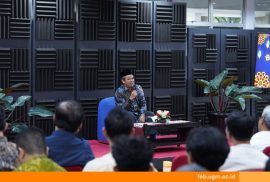The Economics Study Program curriculum is designed to equip students with a strong theoretical understanding and sharp analytical skills in the field of economics. This curriculum is developed based on national higher education standards, input from stakeholders, and the latest developments in economics and information technology.
Curriculum for International Undergraduate Program (IUP) – Program Study of Economics
Based on Curriculum: Year of 2024 | Year of 2022 | Year of 2018
| Semester 1 | ||||||
|---|---|---|---|---|---|---|
| Code | Courses | Credits | Compulsory Credits | Elective Credits |
Type | Prerequisite |
| EBIE222101 | Introduction to Economics 1 | 3 | 3 | C | ||
| EBIE222102 | Mathematics 1 | 3 | 3 | C | ||
| AKU1601 | Introducing to Accounting | 3 | 3 | C | ||
| EBMN212101 | Introduction to Business | 3 | 3 | C | ||
| UNU1000 | Religion 1: Islam | 2 | 2 | C | ||
| UNU1001 | Religion 1: Catholic | 2 | C | |||
| UNU1002 | Religion 1: Christian | 2 | C | |||
| UNU1003 | Religion 1: Hinduism | 2 | C | |||
| UNU1004 | Religion 1: Buddhism | 2 | C | |||
| UNU1005 | Religion 1: Konghucu | 2 | C | |||
| EBIE222103 | English | 2 | 2 | C | ||
| EBIE222104 | Statistics 1 | 3 | 3 | C | ||
| EBIE222105 | Public Speaking | 2 | 2 | C | ||
| Sub total Semester 1 | 21 | 21 | ||||
| Semester 2 | ||||||
| EBIE222201 | Introduction to Economics 2 | 3 | 3 | C | ||
| EBIE222202 | Mathematics 2 | 3 | 3 | C | Mathematics 1 | |
| EKO1109 | Mathematical logic | 3 | 3 | C | ||
| EBIE222204 | Statistics 2 | 3 | 3 | C | Statistics 1 | |
| EKO3102 | Religion 2: Islam | 2 | 2 | C | Religion 1: Islam | |
| EKO3103 | Religion 2: Catholic | 2 | C | Religion 1: Catholic | ||
| EKO3108 | Religion 2: Christian | 2 | C | Religion 1: Christian | ||
| EKO3109 | Religion 2: Hindu | 2 | C | Religion 1: Hindu | ||
| EKO3110 | Religion 2: Buddhism | 2 | C | Religion 1: Buddhism | ||
| EBIE222203 | Religion 2: Konghucu | 2 | C | Religion 1: Konghucu | ||
| EBIE222208 | Indonesian Language and Culture | 2 | 2 | C | ||
| EBIE222205 | Academic Writing | 2 | 2 | C | ||
| Elective Course 1 | 3 | 3 | E | |||
| Sub total Semester 2 | 21 | 18 | 3 | |||
| Semester 3 | ||||||
| EBIE222106 | Microeconomics 1 | 3 | 3 | C | Introduction to Economics 1 and Mathematics 2 | |
| EBIE222107 | Macroeconomics 1 | 3 | 3 | C | Introduction to Economics 2 and Mathematics 2 | |
| EBIE222108 | Sociology Economics | 2 | 2 | C | ||
| UNU1100 | Pancasila | 2 | 2 | C | ||
| UNU3000 | Civics | 2 | 2 | C | ||
| Elective Course 2 | 3 | 3 | E | |||
| Elective Course 3 | 3 | 3 | E | |||
| Elective Course 4 | 3 | 3 | E | |||
| Subtotal Semester 3 | 21 | 12 | 9 | |||
| Semester 4 | ||||||
| EBIE222206 | Microeconomics 2 | 3 | 3 | C | Microeconomics 1 | |
| EBIE222207 | Macroeconomics 2 | 3 | 3 | C | Macroeconomics 1 | |
| EKO2601 | Development Economics 1 | 3 | 3 | C | Microeconomics 1 and Macroeconomics 1 | |
| EKO2401 | Monetary Economics 1 | 3 | 3 | C | Microeconomics 1 and Macroeconomics 1 | |
| EKO2201 | Public Economics 1 | 3 | 3 | C | Microeconomics 1 and Macroeconomics 1 | |
| EBIE222209 | International Trade 1 | 3 | 3 | C | Microeconomics 1 and Macroeconomics 1 | |
| EKO2112 | Econometrics 1 | 3 | 3 | C | Microeconomics 1 and Macroeconomics 1 and Statistics 2 and Mathematics 2 | |
| Sub total Semester 4 | 21 | 21 | ||||
| Semester 5 | ||||||
| EKO2602 | Development Economics 2 | 3 | 3 | C | Development Economics 1 | |
| EKO2202 | Public Economics 2 | 3 | 3 | C | Public Economics 1 | |
| EKO2402 | Monetary Economics 2 | 3 | 3 | C | Monetary Economics 1 | |
| EBIE222109 | International Finance 2 | 3 | 3 | C | Microeconomics 1 and Macroeconomics 1 | |
| EKO3116 | Macroeconometrics | 3 | 3 | C | Econometrics 1 | |
| EKO3115 | Microeconometrics | 3 | 3 | C | Econometrics 1 | |
| Sub total Semester 5 | 18 | 18 | ||||
| Semester 6 | ||||||
| EBIE222210 | Economic Research Methods | 3 | 3 | C | Econometrics 1 | |
| EKO3702 | Workshop on Development Economics | 3 | 3 | C | Development Economics 2 and Microeconometrics | |
| EKO3703 | Workshop on Monetary Economics | 3 | C | Monetary Economics 2 and Macroeconometrics | ||
| EKO3705 | Workshop on International Economics | 3 | C | International Trade 1 and International Finance 1 | ||
| EKO3706 | Workshop on Public Economics | 3 | C | Public Economics 1 and Public Economics 2 | ||
| Elective Course 5 | 3 | 3 | E | |||
| Elective Course 6 | 3 | 3 | E | |||
| Elective Course 7 | 3 | 3 | E | |||
| Elective Course 8 | 3 | 3 | E | |||
| Sub total Semester 6 | 18 | 6 | 12 | |||
| Semester 7 | ||||||
| Elective Course 9 | 3 | 3 | E | |||
| Elective Course 10 | 3 | 3 | E | |||
| Elective Course 11 | 3 | 3 | E | |||
| Elective Course 12 | 3 | 3 | E | |||
| Elective Course 13 | 3 | 3 | E | |||
| Sub total Semester 7 | 15 | 15 | ||||
| Semester 8 | ||||||
| EKO4101 | Thesis | 6 | 6 | C | Workshop on Development Economics or Workshop on Monetary Economics or Workshop on International Economics or Workshop on Public Economics, and Economics Research Methods and SKS>=132 and IPK>=2,00 |
|
| UNU222001 | Student Service Learning | 4 | 4 | C | SKS>=96 and IPK>=2.00 | |
| UNU222004 | Knowledgement Management Application | 2 | 2 | C | SKS>=96 and IPK>=2.00 | |
| UNU222002 | Community Communication | 2 | 2 | C | SKS>=96 and IPK>=2.00 | |
| UNU242033 | Health Literacy | 2 | 2 | C | SKS>=96 and IPK>=2.00 | |
| Sub total Semester 8 | 16 | 16 | ||||
| Total Credits for Compulsory Courses | 112 | |||||
| Total Credits for Elective Courses | 39 | |||||
| Total Credits Semester 1-8 | 151 | |||||
Notes:
- The minimum grade to graduate for all courses is C
- The minimum credit to graduate is 151 SKS
- The study plan package is only for the first semester (20 credits), for the 2nd semester and subsequent semesters students need to carry out independent study planning.
- There is an adjustment to the number of KKN credits to 4 credits accompanied by 6 credits for the additional compulsory courses stated in the table above. Hence, KKN weighs 10 credits consisting of 4 courses. This regulation applies to students from batch 2022 and onwards.
- The maximum credit for 2nd semester is 20 credits.
List of Elective Courses
| No | Code | Courses | Credits | Type | Prerequisite |
|---|---|---|---|---|---|
| 1 | EBIE222110 | History of Economic Thought | 3 | E | Microeconomics 1 and Macroeconomics 1 |
| 2 | EBIE222111 | Business Economics | 3 | E | Introduction to Economics 1 and Introduction to Economics 2 |
| 3 | EBIE222112 | Crime Economics | 3 | E | Microeconomics 2 |
| 4 | EBIE222113 | Conflict Economics | 3 | E | Microeconomics 2 |
| 5 | EBIE222114 | Bank and Financial Institutions | 3 | E | Microeconomics 1 and Macroeconomics 1 |
| 6 | EBIE222115 | Experimental Economics | 3 | E | Microeconomics 1 and Microeconomics 2 |
| 7 | EBIE222116 | Economics of Education | 3 | E | Microeconomics 1 and Macroeconomics 1 |
| 8 | EBIE222117 | Energy Economics | 3 | E | Microeconomics 1 and Macroeconomics 1 |
| 9 | EBIE222118 | Central Banking | 3 | E | Microeconomics 1 and Macroeconomics 1 |
| 10 | EBIE222119 | Gender Economics | 3 | E | Microeconomics 2 |
| 11 | EBIE222212 | Planetary Health and Sustainability | 2 | E | Introduction to Economics 1 |
| 12 | EKO2231 | Regional Economics | 3 | E | Microeconomics 21 and Macroeconomics 1 |
| 13 | EKO2232 | Urban Economics | 3 | E | Microeconomics 1 and Macroeconomics 1 |
| 14 | EKO3104 | Indonesian Economy | 3 | E | Introduction to Economics 1 and Introduction to Economics 2 |
| 15 | EKO3112 | Islamic Economics | 3 | E | Introduction to Economics 1 and Introduction to Economics 2 |
| 16 | EKO3113 | Islam and Economic Development | 3 | E | Introduction to Economics 1 and Introduction to Economics 2 |
| 17 | EKO3501 | Industrial Economics | 3 | E | Microeconomics 1 and Macroeconomics 1 |
| 18 | EKO3707 | Agricultural and Rural Economics | 3 | E | Microeconomics 1 and Macroeconomics 1 |
| 19 | EKO4201 | Environmental Economics | 3 | E | Microeconomics 1 and Macroeconomics 1 |
| 20 | EKO4204 | Health Economics | 3 | E | Microeconomics 1 and Macroeconomics 1 |
| 21 | EKO4302 | International Business | 3 | E | Introduction to Economics 1 and Introduction to Economics 2 |
| 22 | EKO4404 | Islamic Financial System and Institutions | 3 | E | Introduction to Economics 1 and Introduction to Economics 2 |
| 23 | EKO4603 | Game Theory | 3 | E | Microeconomics 1 |
| 24 | EKO4604 | Development Planning | 3 | E | Microeconomics 1 and Macroeconomics 1 |
| 25 | EKO4608 | Labor Economics | 3 | E | Microeconomics 1 and Macroeconomics 1 |
| 26 | EKO4707 | Cooperative Economics | 3 | E | Introduction to Economics 1 and Introduction to Economics 2 |
Note:
- The minimum grade to graduate from the course is C




